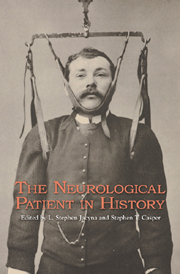Book contents
- Frontmatter
- Contents
- Preface
- Acknowledgments
- Introduction
- Part One Medicine Constructs the “Neurological Patient”
- Part Two Public and Private Constructions of the “Neurological Patient”
- 3 Speaking for Yourself: The Medico-Legal Aspects of Aphasia in Nineteenth-Century Britain
- 4 The Spouse, the Neurological Patient, and Doctors
- Part Three Patient Groups Construct the “Neurological Patient”
- Part Four The Patient Constructs the “Neurological Patient”
- Part Five Historians Construct the “Neurological Patient”
- Bibliography
- List of Contributors
- Index
3 - Speaking for Yourself: The Medico-Legal Aspects of Aphasia in Nineteenth-Century Britain
from Part Two - Public and Private Constructions of the “Neurological Patient”
Published online by Cambridge University Press: 12 September 2012
- Frontmatter
- Contents
- Preface
- Acknowledgments
- Introduction
- Part One Medicine Constructs the “Neurological Patient”
- Part Two Public and Private Constructions of the “Neurological Patient”
- 3 Speaking for Yourself: The Medico-Legal Aspects of Aphasia in Nineteenth-Century Britain
- 4 The Spouse, the Neurological Patient, and Doctors
- Part Three Patient Groups Construct the “Neurological Patient”
- Part Four The Patient Constructs the “Neurological Patient”
- Part Five Historians Construct the “Neurological Patient”
- Bibliography
- List of Contributors
- Index
Summary
Introduction
Throughout the eighteenth and early nineteenth century there was consideration of the status of persons deemed insane. Two legal issues were relevant: acts of criminal behavior such as violent attack or murder leading to the possibility of prison or the death sentence, and more general aspects of social functioning and the question of confinement in asylums. With the emergence of the concept of a disorder of expression due to specific brain damage and the coining of the term “aphasia” in the second half of the nineteenth century, a new group of people whose civil rights required protection was identified: those whose ability to understand others' intentions and express their own had been compromised by illness. Although there is a large body of historical research into criminal law and insanity during this period, very little work has been carried out with regard to mental deficiency and civil law. Peter Bartlett stressed the need for research in this area: “Study of the determination of civil competency has been marginal in the history of modern law and madness to the point of being almost ignored.” Bartlett expanded on this theme as follows: “Valuable work has been done on the history of criminal insanity, and work is beginning to appear regarding confinement in private madhouses and county asylums. The insights gained therein have not, by and large, been extended into the civil issues of competency determination nor have relations between law and medicine been theorized outside the context of criminal insanity.”
- Type
- Chapter
- Information
- The Neurological Patient in History , pp. 63 - 80Publisher: Boydell & BrewerPrint publication year: 2012

